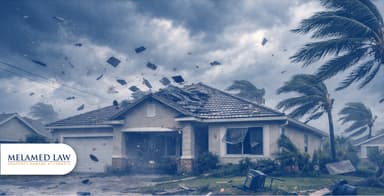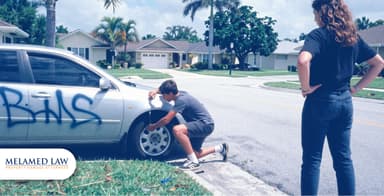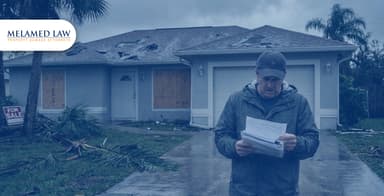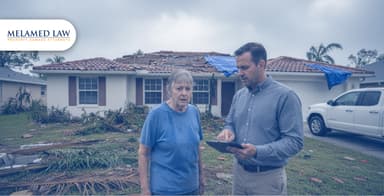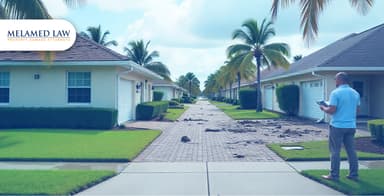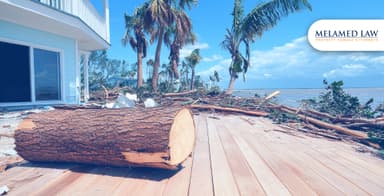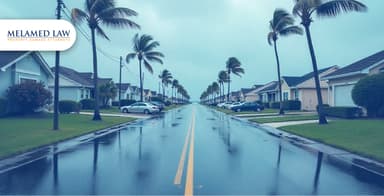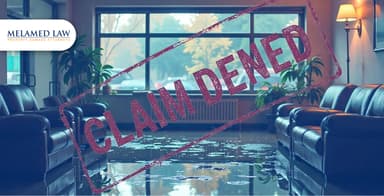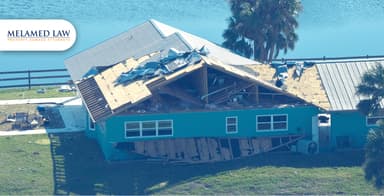
How to File a Water Damage Insurance Claim in Florida
When the unexpected happens, we help individuals and businesses collect the money they deserve for their insurance claims.
Melamed Blogs
May 24, 2025
How to File a Water Damage Insurance Claim in Florida

You file a claim because that’s what insurance is for. But then come the delays. The emails that go unanswered. The settlement offer barely covers the cost of a decent repair. You did everything right—took the photos, noted the damage, followed the rules. And yet, the process stretches on, as if the goal were not to help, but to exhaust you.
So, how do you fight back? How do you make sure your claim isn’t just another file collecting dust on some adjuster’s desk? It starts with knowing the game—your coverage, the loopholes, the red flags. But even knowledge has its limits. And when the system refuses to play fair, what then? Let’s get into it.
1) Understand Your Coverage Before You Need It
Regularly reviewing and updating your insurance policy ensures you're protected against Florida's unique risks. But first, start by understanding your policy and identifying any exclusions.
Review Your Insurance Policy:
It's essential to know precisely what your homeowner's insurance covers regarding water damage. Generally, standard policies cover sudden, accidental water damage, like a burst pipe or appliance overflow. However, damage from ongoing maintenance issues, such as leaks from a sink or washing machine, is typically not covered and could lead to a denied claim.
It's also important to distinguish between water damage and flood damage. Standard homeowners insurance policies usually do not cover flood damage, which can result from storms, overflowing lakes, rivers, or oceans, and over-saturated ground. Given Florida's high water table and susceptibility to heavy rainfall, considering separate flood insurance is advisable.
2) Report the Water Damage Immediately

Delaying the reporting of water damage can weaken your claim or lead to its denial, as insurers may argue that the delay prejudiced their ability to investigate the loss.
Notify Your Insurance Company As Soon As You Discover Any Damage :
Promptly reporting water damage can ensure your claim is processed efficiently and reduce the risk of disputes with your insurer. Florida law requires that property damage claims be filed within specific timeframes.
Use the Right Terminology:
Accurately describing the cause of damage is essential to ensure appropriate coverage:
Water Intrusion vs. Flooding: Clearly differentiate between "water intrusion from a storm," which may be covered under standard homeowners insurance, and "flooding," which typically requires separate flood insurance.
Clarify Details: Refrain from using terms like "long-term leak," which might suggest neglect or maintenance issues, potentially leading to claim disputes.
3) Document Everything Thoroughly
When facing water damage, proper documentation is essential to support your insurance claim and facilitate a smooth restoration process. Here's how to ensure you capture all the necessary details for a fair evaluation :
Take High-Quality Photos & Videos:
Capture Comprehensive Evidence: Photograph and videotape all affected areas, including standing water, wet walls, damaged furniture, and any signs of mold growth. Ensure you document both the interior and exterior of your home, covering structural and personal property damage.
Utilize Timestamps: If possible, use devices that automatically timestamp your photos and videos. This adds credibility by providing a clear timeline of when the damage occurred.
Keep a Detailed Damage Inventory:
Itemize Damaged Property: Create a comprehensive list of all damaged items, noting their descriptions, purchase dates, and estimated values. Including receipts or proof of purchase can strengthen your claim.
Document Emergency Repairs: Retain receipts and records for any immediate repairs or services, such as water extraction or drying services. This demonstrates proactive measures to mitigate further damage.
What NOT to Throw Away:
After experiencing water damage, handle damaged items carefully to support your insurance claim:
Retain Damaged Items for Inspection: Do not dispose of any damaged property until your insurance adjuster has inspected it. Physical evidence is vital for substantiating your loss and ensuring a fair settlement.
Photograph Items Before Disposal: If certain items pose health risks, such as mold-infested materials, and must be discarded before the adjuster's visit, thoroughly document them with photographs and detailed descriptions. This documentation serves as evidence during the claims process.
4) File Your Claim with Strong Supporting Documents

Filing a water damage insurance claim requires strong preparation to ensure a smooth process and a favorable outcome. Here's how to bolster your claim effectively:
Double-Check Details: When completing claim forms, ensure all information is precise and complete. Errors or omissions can lead to processing delays or even claim denials.
Obtain Expert Evaluations: Engage professionals such as contractors, plumbers, or mold specialists to assess the damage (If Possible). Their detailed reports can substantiate the extent and cause of the damage, adding credibility to your claim.
Check For Free Assessments: Some restoration companies offer complimentary damage evaluations. Utilizing these services can provide valuable documentation without additional costs, strengthening your claim.
5) The Adjuster's Inspection—How to Get the Best Outcome
The insurance adjuster's inspection is an important step in ensuring a fair settlement for your water damage claim. Here's how to approach this process effectively:
Be Present During the Inspection:
Accompany the adjuster as they assess your property, pointing out all areas affected by water damage. This proactive approach ensures that no damage goes unnoticed, which is crucial for an accurate evaluation.
Have a Contractor’s Estimate Ready:
Before the adjuster's visit, secure a detailed repair estimate from a reputable contractor. This serves as a benchmark against the adjuster's assessment and can be instrumental in negotiating a fair settlement.
Ask for a Copy of the Adjuster’s Report:
After the inspection, request a copy of the adjuster's report. Carefully examine it for any inconsistencies or gaps. Addressing these promptly with your insurance company can prevent potential disputes and ensure all damages are accounted for.
6) Avoid These Costly Mistakes

To ensure a smooth process and expand your settlement, steer clear of these common pitfalls:
Not Filing Early Enough:
Consequences of Delay: Failing to report a claim promptly can hinder the insurer's ability to assess the damage accurately, potentially leading to claim denial.
Underestimating the Damage:
Comprehensive Damage Assessment: Some damages, like structural issues or hidden mold growth, may not be immediately visible. Engaging professionals for a thorough inspection ensures all damages are identified and included in your claim.
Accurate Documentation: Detailed records and photographs of all affected areas support your claim and help prevent disputes over the extent of the damage.
From Claim Denial to Full Compensation: How Melamed Law PLLC Can Help
Filing a water damage insurance claim in Florida is common, but taking the right steps—reporting promptly, documenting thoroughly, and negotiating effectively—can significantly improve your chances of a fair payout. However, even when you do everything right, insurance companies may still delay, deny, or undervalue your claim.
Melamed Law PLLC comes with experienced property damage attorneys, and we know how to challenge unfair claim decisions, negotiate with insurers, and maximize your compensation. Whether your claim is stuck in delays, wrongfully denied, or underpaid, we fight for your rights and help you recover the full amount needed to repair your property. Don’t let the insurance company dictate your settlement. Contact Melamed Law PLLC for a free consultation and let us turn your claim around.
Recent Cases


